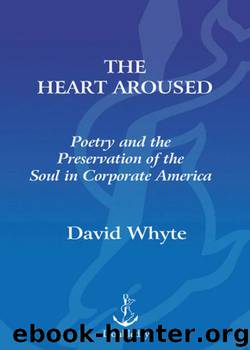The Heart Aroused: Poetry and the Preservation of the Soul in Corporate America by David Whyte

Author:David Whyte [Whyte, David]
Language: eng
Format: epub
Tags: Fiction
Publisher: Crown Publishing Group
Published: 2007-12-17T23:00:00+00:00
THE SOUL DECLARES ITSELF
Fionn made no attempt to run but looked straight into the eye of the bloodthirsty man who was surely about to finish him. Unnerved, Call Mac Cona hesitated for a moment and shouted, “Who are you?”
“I am Fionn . . . the son of Uail, son of Baiscne,” shouted the youth. The red, swollen mouth of his attacker fell open. His hard eyes grew moist and wild. “In God’s name, my captain’s son,” cried Call.
In the shape of this itinerant murderer, Fionn had met one of his dead father’s lieutenants, now clanless and fugitive, preying violently on the edge of a society that offered no home. “He was at war,” says Stephens, “with a world which had dared to kill his chief.”
This description of Call reminds me of a vivid conversation I had with a very bitter man in the cafeteria of a large telecommunications company. His mentor and sponsor had been sacked that very day, and he viewed the surviving executives who had engineered his mentor’s demise as his enemies. I could feel the palpable hatred in this man. His career at a dead end, he was ready to spring out of the thicket and swing his sword at whatever he found. His chief weapon of defense was a sharp-edged and destructive cynicism. I imagine that any young, newly hired person who had to work with him would suffer the same fate as the young poets in the story of Fionn. In effect, not having any connection with his own inner sponsor, his soul, this man felt completely betrayed when his outer sponsor disappeared and would kill everyone in his path by way of revenge.
Call, at least, recognizes a true outer representation of his soul in the shape of Fionn. “Will I not be your man,” says Call, “and teach you all the cunning that I know?” “You will,” says Fionn firmly, and accepts his hand.
At a crucial moment, Fionn must declare his lineage, or he will be killed. He must know from whom he is descended, where his strength comes from, and what kind of blood flows in his veins. Otherwise that part of the world that has been orphaned without any training or preparation will kill him out of its own grief and alienation.
In the inner cities we see gangs of effectively fatherless youths, attempting to initiate one another with no older men in sight. When they finally look the adult world in the eye, they cannot answer the life-or-death question in the same way. “I am Fionn . . . the son of Uail, son of Baiscne.” This is particularly magnified in the United States. Having no familial destiny to bind them, young men often float into the streets, victims of random drive-by shootings or anonymous drug deaths. At present, an astounding 15 percent of the young American male population is in the corrective system, the instinctual wish for the older male replaced unconsciously in the guise of the prison guard.
But equivalent drive-by shootings occur every day in the office.
Download
This site does not store any files on its server. We only index and link to content provided by other sites. Please contact the content providers to delete copyright contents if any and email us, we'll remove relevant links or contents immediately.
The Universe of Us by Lang Leav(15069)
The Sun and Her Flowers by Rupi Kaur(14511)
Adultolescence by Gabbie Hanna(8923)
Whiskey Words & a Shovel II by r.h. Sin(8009)
Love Her Wild by Atticus(7753)
Smoke & Mirrors by Michael Faudet(6184)
Wiseguy by Nicholas Pileggi(5771)
The Princess Saves Herself in This One by Amanda Lovelace(4973)
Love & Misadventure by Lang Leav(4843)
Memories by Lang Leav(4796)
Milk and Honey by Rupi Kaur(4743)
Bluets by Maggie Nelson(4548)
Too Much and Not the Mood by Durga Chew-Bose(4338)
Pillow Thoughts by Courtney Peppernell(4273)
Good morning to Goodnight by Eleni Kaur(4232)
The Poetry of Pablo Neruda by Pablo Neruda(4098)
Algedonic by r.h. Sin(4056)
HER II by Pierre Alex Jeanty(3606)
Stuff I've Been Feeling Lately by Alicia Cook(3451)
